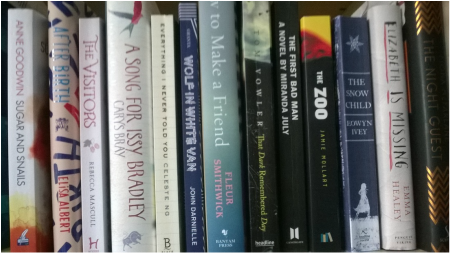| | Following on from last month’s post for World Suicide Prevention Day, I’m marking World Mental Health Day on Annecdotal this weekend. The 2015 theme is dignity, so I’m highlighting sympathetic portrayals of mental health issues in fiction. I’ve blogged elsewhere about the mental health themes in my own novel, Sugar and Snails, including the development of the false self to protect one’s vulnerabilities; insecure attachment; and invisible vulnerabilities and self-harm; as well as my personal connection to those issues in the struggle to find a mind of my own and my post on Stigma Fighters about being a wounded healer. So I won’t repeat that here (but do follow the links if you haven’t already); focusing instead on the ways in which my recent reading provide insight into the mental health challenges we face across the lifespan. The fragility of early parenthood couldn’t be captured better than in the character of Ari in After Birth by Elisa Albert. Still traumatised by an overly medicalised birth, she’s lonely and she’s angry at the structures that estrange women from vital sources of genuine support. This should be considered a prerequisite of a healthy society, not only for the sake of the struggling parents, but for the future well-being of their offspring. Cuts in public spending in these areas hurt us all. |

Because children’s behaviour can’t logically be separated from that of their parents, I’m suspicious of the diagnosis of mental illness in young children. The feral tantruming six-year-old in The Visitors isn’t mentally ill, but angry, lonely and scared because no-one has yet found a way through the barriers of deafness and blindness to make her feel safe. When, in A Song for Issy Bradley, seven-year-old Jacob starts behaving oddly at school, it’s because no-one has helped him make sense of his feelings after the sudden death of his little sister.
The developmental tasks of adolescence are so complex, I’m in awe of anyone who comes through unscathed. For some young people, like Lydia in Everything I Never Told You, the burden to fulfil the dreams of their parents can push them to breaking point. For others, like Sean in Wolf in White Van, the meaninglessness of existence leads them to self-destruct. That fragility can endure well beyond the teen years, blurring the boundary between fantasy and reality as Alice does in How to Make a Friend, released this week in paperback and marked on Annethology with a new Q&A with the author, Fleur Smithwick.
Freud is credited with saying that love and work are the cornerstones of a healthy existence, but readers know that both can drive us mad. Stephen questions his sanity after a violent outbreak at work, although his actions aren’t a patch on those of his war-traumatised father in That Dark Remembered Day. The compromises we make between the need to earn a living and the questionable ethics of capitalism can lead to breakdown, as it does for James in The Zoo. But even non-profit organisations have their crazy side, which makes me wonder how much of Cheryl’s weirdness is attributable to personality and how much down to organisational culture in The First Bad Man.
But the loss of work can also be stressful, especially for someone with a well-developed inner curmudgeon like the eponymous hero in A Man Called Ove. Loneliness and unfulfilled longing can also be destabilising in later life, as it is initially for Mabel in The Snow Child. On top of that, old age is also associated with an increased risk of dementia, and not even the playful portrayal of dignified but dotty old ladies in The Night Guest and Elizabeth Is Missing can diminish our fears about that.
Beginning to draft this post prior to the announcement of the Carrot Ranch flash fiction prompt, I’d already resolved to combine the two when the theme of thieving was revealed. I hesitated at first, but then the sense of the story came quickly, all I had to do was juggle those words:
She recognised the hole by the rough edges that scraped against her soul when the sky was overcast. They mocked her at the clinic, said it was impossible for a nothing to make her sick. Refusing her an x-ray, they accused her of malingering, but the hole grew bigger so she went to the mall.
Miles of shiny new things to plug a heart-shaped hole: she stuffed them in her pockets, in her handbag, up her jumper, but the hole remained.
Prison gave her solace. If she couldn’t close the gap within her, she could fill a cell-shaped hole.
Apologies for the plethora of links, but do pursue any that take your fancy. Any of the novels pictured would be worth a read.





















 RSS Feed
RSS Feed





















